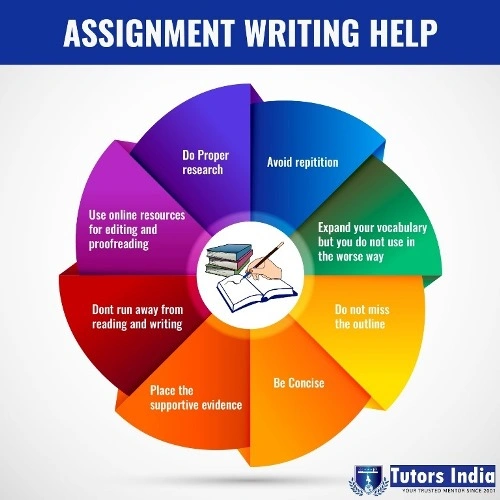How to Improve Your Assignment writing skills
Introduction
Students are frequently known to get the jitters when writing an assignment. Usually, students are petrified with the thought of tackling an assignment writing task as a part of their Master’s course. Akin to painting, writing is a manner of expression. It is a skill that can be sharpened with some knowledge and ample practice. Once you understand the technique behind it, and gain proficiency in terms of blending originality and terminology and styles with your imagination, you will be in a better position to tackle it. However, developing a coherent and effective assignment writing capability would require time (Prathap et al., 2019). The flow of the assignment and the structure of the paragraph are of much significance as far as impeccable assignment writing is concerned. It is also necessary that the assignment be documented as per academic norms. Experts at Tutors India are highly experienced in extending assignment writing help. Based on the experience of experts from Tutors India, the following recommendations would help you to develop your writing skills and build your assignment.

Figure 1. Writing Skills Explained
Source: Tutors India (2022)
Recommendations to Develop your Assignment Writing Skills
Significance of Reviewing
Once you commence with the process of writing your assignments, it would help if you get an understanding about tackling assignment writing and brush up on your vocabulary. However, please note that you need not immediately enroll in some programme for enhancing your assignment writing skills. Instead, it would help if you understand the significance of reviewing and mastering the terminology, process and styles of writing. In addition, the style of writing an assignment would vary significantly from a non-academic writing (fiction for example). As an outcome, students pursuing a Masters course in the UK need to be aware of several tips to develop an effective assignment.
Try to Write Something New
The journey from a novice assignment writer to an expert requires days of practice. As they say, practice makes perfect, you stand to hone your writing skills with ample practice. There is no substitute to continuous practice. No matter how busy you might be, you need to find some time to write something every day. To acquire absolute mastery over the art of assignment writing, it is imperative that you write at least one or two pages every day. The easiest way here would be to start the habit of maintaining a written diary. This will go a long way when you tackle your assignment writing tasks (Wilson & Roscoe, 2020).
Keeping it Simple
In an attempt to create an impression, most students try to sound intelligent through the UK assignments they write. In the process, they tend to abuse jargons which are included a plenty within the assignment. In case you fall in the same school of thought, you should know that it is incorrect. The mantra here would be keeping it simple. There is always sense in simplicity. Being simple while writing your Masters assignment writing tasks will help in ensuring engagement with your reader. Therefore, it is advisable to keep it simple and terse, to the point.
Short and Sweet Works
UK assignments that are unnecessarily long would tend to create disinterest. The purpose of writing your assignment would be better served if you do not make it too complicated. If in your assignment you want to make a point, it would be better if you are to the point rather than beating around the bush. If you can say more with less words that would be your best bet to obtain top scores in your assignment writing tasks.
Have a Plan
One of the most important assignment writing tips that experts at Tutors India vouch for is having a plan for any assignment that you write. You cannot walk-in blindly with no plan in place. To ensure effective assignment writing, you should chalk-out a plan. A plan that is well-thought out will go a long way in your assignment writing task. Before you delve into writing your assignment, you need to collect the relevant information / papers that you require. You also need to jot down your thoughts or ideas. Having a thorough plan would be instrumental in writing a term paper.
Know your Audience
Being aware of your target audience before you start writing a term paper is of utmost significance. Since you are writing an assignment for your university or college, your target audience would be your supervisor or lecturer. Here, you should anticipate what the supervisor/lecturer would look for in the assignment you write, that will ensure that you breeze through the process. Tutors India offers exemplary assignment writing services and we have an experienced team of research paper helpers who can help you develop your assignments as per your intended audience.
Mandatory Conclusion
Effective assignment writing occurs when your assignment is complete in all respects. Most often, students leave their assignments hanging without a conclusion. Anything that has a beginning would necessarily have an end. Students often start their assignment with an ‘introduction’ section, but most of the times, they fail to close it with a ‘conclusion’ section. Sometimes, assignments do have a conclusion but it is rather weak. Mandatorily include a conclusion which covers the key points from your assignment but at the same time, make sure that you do not introduce anything new in the conclusion.
Conclusion
Tutors India is well-versed with the finer nuances of writing great assignments and offer excellent assignment writing services. The assignment writing tips above mentioned have been delivered by our team of highly qualified and experienced experts. Adhering to these golden rules would help you to achieve success in your assignment writing tasks.
References
- Prathap, T. S., Ali, M. A., & Kamraju, M. (2019). How to write an academic research paper. Journal of Emerging Technologies and Innovative Research, 6(04), 488–493.
- Wilson, J., & Roscoe, R. D. (2020). Automated Writing Evaluation and Feedback: Multiple Metrics of Efficacy. Journal of Educational Computing Research, 58(1), 87–125.

 Previous Post
Previous Post Next Post
Next Post